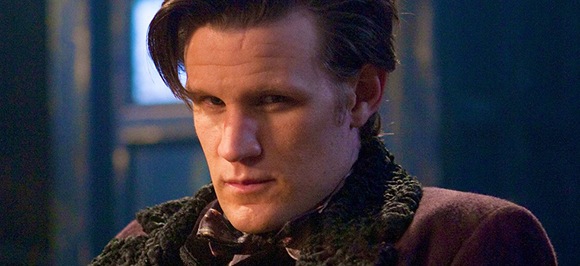In advance of Doctor Who‘s return to our TVs this weekend, The Guardian has an excellent article on how the show hasn’t aired an episode written by a woman since 2008. That’s 60 episodes, not-a-one of which was written by a woman. Even before then, Who‘s only had one female writer, Helen Raynor, since the dawn of the New Who era. And the number of episodes in season seven written by a women is, you guessed it, zero.
Doctor Who, I’m disappointed in you.
Asked by the Guardian’s Mathilda Gregory about the show’s plans to hire more female writers (something then-executive producer Caroline Skinner said last year that she planned to do, but which hasn’t happened yet), producer Marcus Wilson explained:
“Due to schedules and other projects, both male and female writers whom we have wanted to join the team simply haven’t been able to.”
Well… OK. While not exactly reassuring, that response at least leaves the door open to the possibility that Doctor Who has been pursuing female writers. They just haven’t been able to get the ones they wanted. I’m sure they’ll keep trying. It’s not great, but it could be wor—
“For us it’s about who can write good Doctor Who stories, regardless of gender.”
STOP.
RIGHT.
THERE.
I am so sick of that cop-out, BS argument. Marcus Wilson, let me explain you a thing.
If a show has zero female writers, it’s not because there are somehow zero female writers who are qualified to do that job. In the Guardian article Jenny Colgan, who wrote a Doctor Who tie-in novel, points out just a few female writers with a “proven track record” in sci-fi, among them Margaret Atwood, J.K. Rowling, Ursula le Guin, and Suzanne Collins. If your response is “But they’re novelists, they wouldn’t write for a TV show!,” I invite you to check out CultBox’s (excellent) list of five female writers we’d like on Doctor Who.
Gender inequality in the writer’s rooms of sci-fi and fantasy shows is particularly severe; for example, The Sarah Jane Adventures had no female writers, and of the 65 episodes of Merlin only four of them were written by women. That 65-to-4 ratio [Edit: Aaaand that woud be 61-to-4, actually] is not because women aren’t able to, or don’t want to, write for genre TV shows.
Rather, it’s due in large part to the fact that the TV and film industries, more than just having a long history of being male-dominated, were built upon the idea that men hold leadership positions, whether it’s being a director or a writer or a studio exec. With few exceptions, that’s how things were in the formative years of the industry, and that’s how they’ve continued to be, even though few(er) people think (or would admit to thinking, at least) that women can’t do the job.
Back me up, Doctor Who and Primeval writer Paul Cornell:
“A lot of it is down to mere tradition. TV writing itself, and then geekdom, have both, historically, been seen as male pursuits. But in both cases, that stereotype is over. OK, it persists as a joke about geekdom, but the reality of it is vanishing.”
Cornell notes that TV writing is catching up to reality, albeit slowly, citing a growing number of female executives and noting that “those executives are genuinely searching for new female talent, [so] perhaps we’re just living during a couple of decades of that talent slowly arriving.” There’s been a growing number of genre shows with female writers in recent years, too, among them Game of Thrones (still just one female writer, but that’s better than none), True Blood, and Once Upon a Time.
That’s a start. But I dont’ want to wait another few decades while the industry catches up. If genre shows want more gender-balanced writing staffs (and they should), they need to stop hiding behind the old “Well, would you look at that. All the writers we’ve hired have penises! Whaddaya gonna do?” excuse and make the conscious decision to hire some female writers.
We’re looking at an imbalance that’s been around—been nurtured and encouraged—for decades. It’s not going to magically go away by itself. Please, Doctor Who. Take the triceratops by the horns here.
(via: The Guardian)
Are you following The Mary Sue on Twitter, Facebook, Tumblr, Pinterest, & Google +?








Published: Mar 27, 2013 02:08 pm